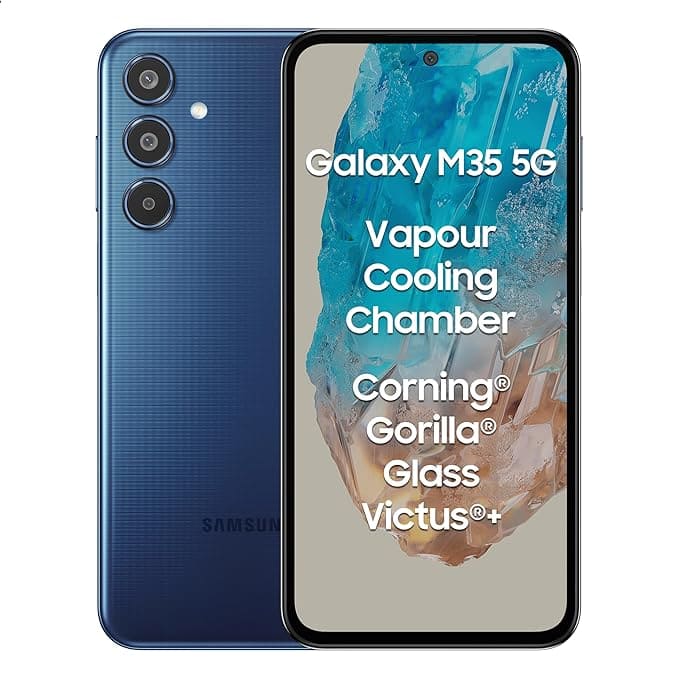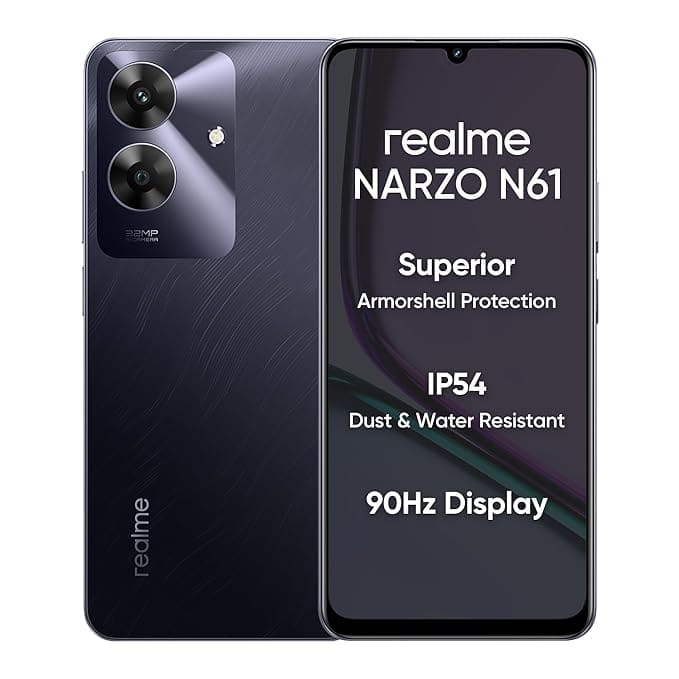English : Unit 5 : Prose : Being Safe
Warm up
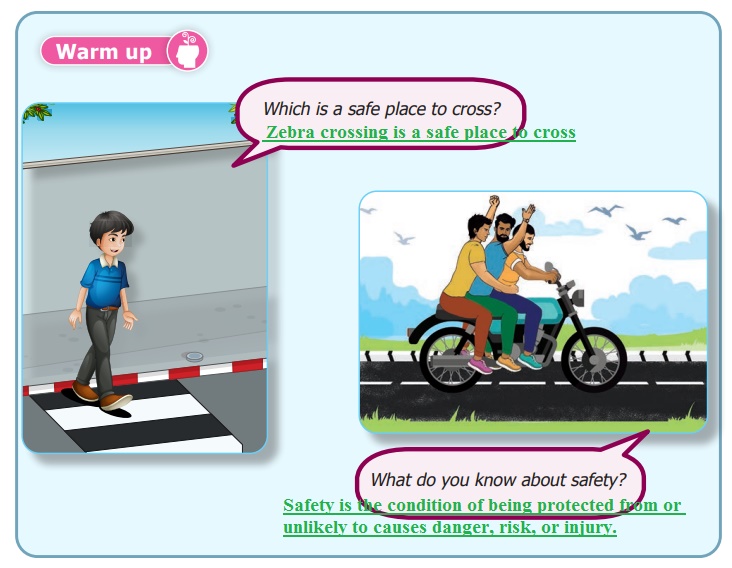
Section – I
Glossary
bifurcates (v) – divide into two separate parts
amuses (v) – to make someone laugh or smile
vacation (v) – holiday
merges (v) – join together
Section – II
Glossary
scorching (v) – extremely hot
sunscreen (n) – a cream or lotion rubbed on the skin to protect it from the sun
exhausted(v) – feeling tired
sunstroke (n) – unconscious or heatstroke brought about by excessive exposure to the sun
giddy (adj) – having a sensation of falling down
nauseated (adj) – sickening, stomach-turning
street smart (adj) – the knowledge to be with difficulties and dangers
Section – III
Glossary
fertilizer (n) – chemical or natural substance added to land to increase its fertility.
antifreeze (n) – a liquid that can be added to water to lower the freez- ing point.
hazardous (adj) – risky; dangerous
emergency (n) – often dangerous situation requiring immediate action.
Questions Answers
Section – I
A. State whether the following statements are true or false.
1. Prasanth had gone to bring coffee to his friends. [Answer: False]
2. Grandpa was so angry seeing Prasanth’s friends. [Answer: False]
3. Prasanth’s friend came on by walk. [Answer: True]
4. Teacher had taught about the rules of road safety. [Answer: True]
Section – II
A. Fill in the blanks.
1. They had come to play under the shade of big Neem tree.
2. We should put on the sunscreen to avoid sun burn.
3. Sunstroke is a more serious health related illness.
4. Mani’s mother had instructed him not to roam in the sun light between 10 a.m. and 3 p.m.
5. Street smart means the knowledge to be with difficulties and dangers.
Section – III
Read and Understand
A. Choose the best answer.
1. Grandpa got a call from ___________.
a) his son
b) wife
c) his old friend
[Answer: (c) his old friend]
2. Medicine should be kept in ___________.
a) fridge
b) kitchen table
c) locked cabinet
[Answer: (c) locked cabinet ]
3. ___________ automotive and gardening products should be secured.
a) gardening products
b) hazardous
c) medicine
[Answer: (b) hazardous]
4. We should have ___________ in our home itself to give medical treatment.
a) first aid kit
b) an injection
c) the hospital
[Answer: (a) first aid kit]
5. Some house ___________ and ___________ are poisonous.
a) used food and plants
b) plants and dog
c) plants and used button cell batteries
[Answer: (c) plants and used button cell batteries]
B. Choose the correct synonyms for the Italic word.
1. Dixie was feeling very exhausted.
a) joy
b) wounded
c) tired
d) rejoiced
[Answer: (c) tired]
2. The neem tree was a big antique in his garden.
a) Modern
b) ancient
c) updated
d) out dated
[Answer: (b) ancient ]
3. Praveen got sun stroke.
a) fever
b) nerves
c) unconscious
d) tired
[Answer: (c) unconscious ]
4. Heat exhaustion prevails.
a) widespread
b) not visible
c) exposive
d) hidden
[Answer: (a) widespread]
C. Choose the correct antonyms for the Italic word.
1. Karan visited his ancestral village.
a) Offspring
b) family
c) house
d) relative
[Answer: correct Answer: non-hereditary]
2. We should use our mobile safely.
a) unsafely
b) securely
c) protect
d) save
[Answer: (a) unsafely]
3. Medicine should be stored.
a) consumed
b) deleted
c) preserved
d) registered
[Answer: (a) consumed]
4. The neem tree provided shelter to many birds.
a) residence
b) unprotection
c) home
d) security
[Answer: (b) unprotection]
5. It is a latest mobile.
a) updated
b) outdated
c) new
d) modern
[Answer: (b) outdated]
D. Answer the following in one or two sentences.
1. What is STREET SMART?
Answer: ‘Street smart’ is the experience and knowledge necessary to deal with the potential difficulties or dangers of life in an urban environment.
2. Which should be used with adults’ supervision?
Answer: Mobile phones should be used by kids only with adult supervision.
3. What according to grandpa is the most serious illness?
Answer: According to grandpa, sunstroke is the most serious illness.
4. What is must in every house hold?
Answer: A first aid kit is a must in every household. It should also have an emergency instruction inside.
E. Answer the following questions in 100 words.
1. How can you make yourself cyber safe?
Answer: We should make ourselves cyber safe by not posting our personal information, photos, vacation plans, etc, in the social media. We should use a unique password with a combination of upper and lower case letters and numbers. Our operating systems (computer or mobile) should be updated regularly. When not in active use, turn off Wi-Fi, Bluetooth, camera, and location services. These functions of our mobile can be misused by others who want to invade our privacy. Don’t download from questionable sites. They can infect your device with viruses and compromise your privacy and safety.
2. What are the safety measures to be followed for sunstroke?
Answer: We may get heat sunstroke when the body cannot cool itself fast enough. If you feel hot, have a headache, feel giddy or nauseated, you should tell an adult. During a heat wave, stay out of the sun and the heat during the hottest hours of the day, between 10 a.m. and 3 p.m. Drink about two litres of water per day. It is good to drink buttermilk, coconut water, fruit juices, etc. Wear lightweight, comfortable dress made of cotton that let air circulate your body. Also, always remember to protect your head by wearing a cap.
3. Write about road safety rules.
Answer: ‘Road Safety Rules’ ought to be followed very strictly whenever we are on the road. The three important rules to be followed on the road are :
(i) When we see the red light, it is an indication to stop.
(ii) The green light gives us the instruction to go.
(iii) Orange light insists us to get ready to go.
While crossing the road, we have to be careful in crossing the road at the zebra crossing. We should walk on our right-hand side, against the traffic, so that we can see the vehicles coming.
ADDITIONAL QUESTIONS
Short Questions with Answers.
1. Point out two safety measures to be followed at home.
Answer: We should learn to put things back in their respective places after using them. Care should be taken not to play with scissors, knives, etc.
2. According to Mani’s mother when is the temperature of the Sun very hot?
Answer: According to Mani’s mother, the temperature of the Sun is very hot between 10 a.m. and 3 p.m.
3. Which should be followed very strictly?
Answer: .‘The rules of the Road Safety’ should be followed very strictly by everyone.
4. What is meant by ‘Sunstroke’?
Answer: Sunstroke is the heatstroke brought about by excessive exposure to the Sun.
5. How could we use medicines safely? ‘
Answer: We should store all medicines out of sight and reach of children. They should be stored in their original containers.
Paragraph Question with Answer.
1. What did grandfather tell about the safety measures, to be followed at home?
Answer: Grandfather told that the children should learn to put things back in their respective places after using them. They should not play with knives and scissors. He also told them about the safety measures to be followed while using the internet. He asked them not to post their personal information, photos, vacation plans etc., in the social media. All the medicines should be stored out of sight and reach of children. Medicines, dangerous automotive and gardening products should be secured and kept locked. A first aid kit is a must in every household.
Vocabulary
Homonyms
Two or more words having the same spelling and pronunciation but different meanings and origins.
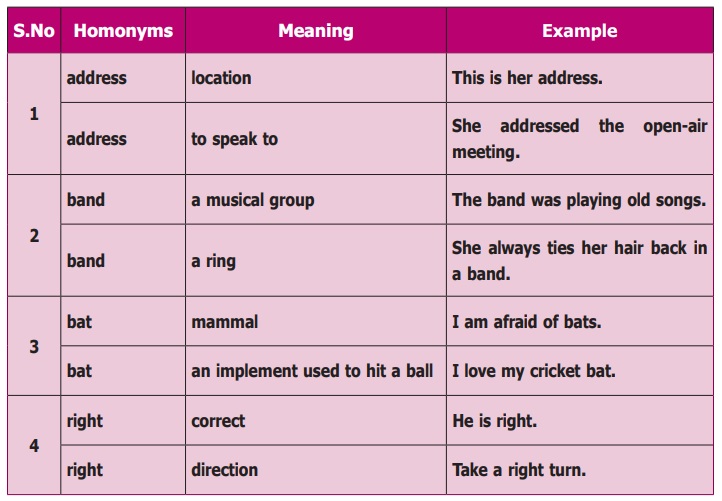
a. Write a sentence of your own for each homonyms.
1. a. bright – very smart or intelligent – Answer: He was a bright student.
b. bright – filled with light – Answer: The hall was bright with colourful lights.
2. a. express – something done fast – Answer: Please send it by express mail.
b. express – convey – Answer: She expressed her sorrow to her friends.
3. a. kind – type – Answer: Please show us this kind of material.
b. kind – caring – Answer: Her teacher was kind to her.
4. a. well – in good health – Answer: I did surprisingly well in my history test.
b. well – water resource – Answer: There is a big well at back of this building.
Phrasal verb
A phrasal verb is a verb that is made up of a main verb together with an adverb or a preposition, or both.
“Catch on” is a phrasal verb which means to understand.
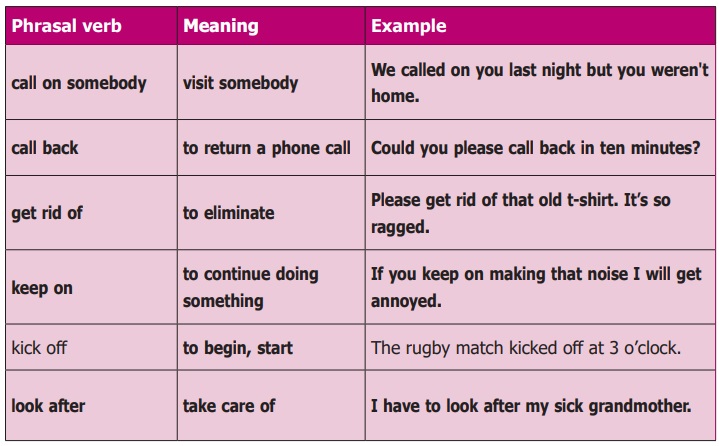
a. Write the meaning for the phrasal verbs.
1. look into [Answer: to examine]
2. give up [Answer: surrender]
3. put off [Answer: postpone]
4. get on [Answer: M manage]
5. take off [ Answer: depart]
b. Use the following phrasal verbs in your own sentence.
1. put up with : I can’t put up with it any longer.
2. keep on : Keep on going and never give up.
3. look after : She looked after her old grandmother.
4. take over : Who will take over the leadership of the club?
5. go through : I apologize for what you had to go through.
VOCABULARY ~ ADDITIONAL
HOMONYMS
Write a sentence of your own for each homonyms
1. (a) park – to leave a vehicle temporarily – Don’t park your car near my house.
(b) park – public land for recreation – I go the park regularly.
2. (a) rose – a flower- He has a rose garden.
(b) rose – past tense of rise’- Sales rose by 30% in the last month.
3. (a) letter – to write letters on a paper – I wrote a letter to my friend.
(b) letter– a written symbol/character – ‘A’ is the first letter of alphabet.
4. (a) nail – the claw of a mammal – I have broken my nail.
(b) nail – a pointed piece of a metal – I hanged the key on a nail
PHRASAL VERBS
Write the meaning for the phrasal verbs:
1. bear with- [Answer: tolerate]
2. carry out – [Answer: perform]
3. give away – [Answer: distribute]
4. put out [Answer: extinguish]
5. step down- [Answer: resign]
6.passed away -[Answer: died]
7.in vain-[ Answer: in failure]
8.inferior to [Answer: of a lower level]
9.thirst for [Answer: yearn]
10. endowed with [Answer: naturally to have a particular quality]
Use the following phrasal verbs in your own sentence:
1. passed away : The old man passed away yesterday.
2. in vain : The attempts of the police to trace the dacoits were in vain.
3. inferior to : Junk foods are inferior to home-made dishes.
4. thirst for : Today’s youth thirst for challenging tasks.
5. endowed with : My grandmother is endowed with a healing touch.
Listening
Listen to the teacher and answer the questions.
Road Safty
Good morning, everybody. Firstly, I would like to thank the headmaster for inviting me to speak on road safety in conjunction with “Road Safety Week”.
Lately, there have been many road accidents in our district. In most cases, they occurred due to carelessness and recklessness : speeding, flouting traffic rules, driving vehicles which were not roadworthy and driving under the influence of drugs or alcohol.
Last week alone, we received about four accident reports per day, with most of the accidents occurring during dusk and peak hours. Out of these, more than half were serious, in which victims had to be hospitalized.
Many of you present here already have driving licenses and the rest will get yours soon. What I want to impress upon you today is that you must make road safety your top priority. Do not take your driving license as a license to kill or to use roads as you like.
Drive or ride carefully and be considerate to other road users. When you are on the road, observe traffic rules and road ethics. Above all, be alert and keep calm. There may be times when you have to give way to other vehicles or let cars overtake you. Do not take this as an insult or a challenge to your pride. It could lead to violence on the road.
I know some youngsters enjoy the thrill of speeding and testing the capability of their machines. They enjoy listening to the revving of their bikes, riding at breakneck speed and overtaking vehicles dangerously. Tell me, what do you get by speeding ? Well, you may reach your destination faster but how much faster ? One minute ? Two ? Is it worth the risk of being involved in accidents, or worse still, being maimed or killed ? It’s not worth it — not worth your money, not worth your life. However, if you still feel generous and would like to donate your money to us, then speed by all means. I assure you we’ll give you a ticket.
Common sense sense should prevail at all times. these are some practical rules on road safety you should always bear in mind.
1. The target audience for this speech is
a. teachers
b. the public
c. primary school students
d. secondary school students
[Answer: d) secondary school students]
2. Why was the speaker invited to speak on road safety ?
a. It was “Road Safety Week”.
b. He is an expert in this field.
c. He had received many accident reports.
d. There had been many accidents near the school.
[Answer: a) It was “Road Safety Week”]
3. Road users can show that they are considerate on the road by
a.hogging the road
b. driving cautiously
c. neglecting traffic rules and road ethics
d. flashing their headlights at oncoming cars
[Answer: b) driving cautiously]
4. When the speaker says, ‘However, if you still feel generous and would like to donate your money to us, then speed by all means’, he is being
a. rude
b. hopeful
c. fatherly
d. sarcastic
[Answer: d) sarcastic]
5. The speaker is most probably a
a. police officer
b. career guidance teacher
c. member of the Red Crescent Society
d. spokesman for the Road Transport Department
[Answer: d) spokesman for the Road Transport Department]
6. What do you understand by common sense should prevail at all times?
a. Learn traffic rules by heart.
b. Follow the actions of other motorists.
c. Think wisely before making any decisions.
d. When in doubt, pull over to the side of the road and seek help.
[Answer: a) Learn traffic rules by heart]
Speaking
Expressing likes and dislikes
The teacher asks the students to express their likes and dislikes using the tables given below.
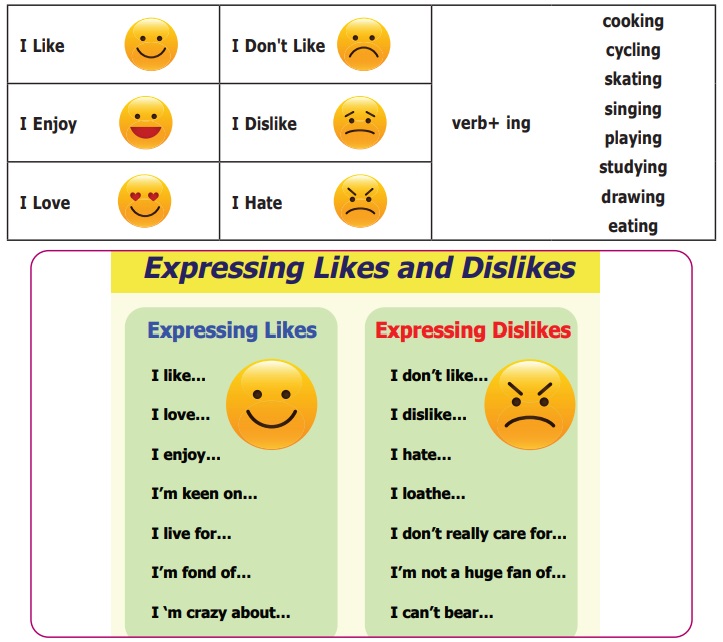
Writing
Arrange the picture in order by writing the numbers 1,2,3 and 4 in the given boxes and write this familiar story in about 100 words.
Make use of the words given below.
thirsty, village, pitcher, disappointment, pebbles , water level
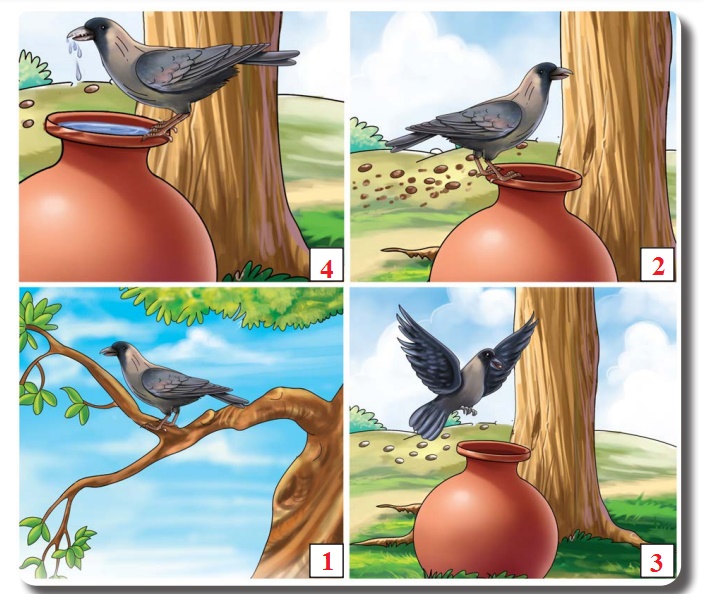
Answer: One hot day, a thirsty crow in a village, searched for water everywhere. At last, it found a pitcher. But there was a disappointment for the crow, as the water level in the pitcher was very low. The crow got an idea. It saw some pebbles nearby. It started putting pebbles in the pitcher. Slowly, the water level raised. The crow drank the water and flew away happily.
Grammar
TENSE – TIME
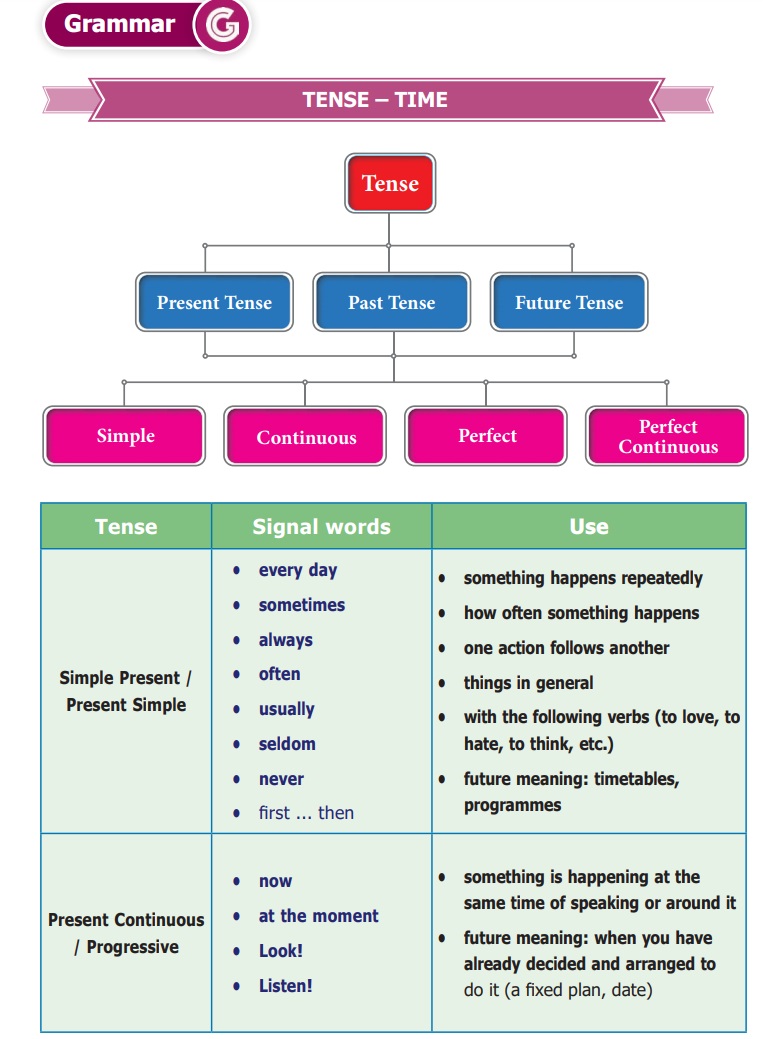
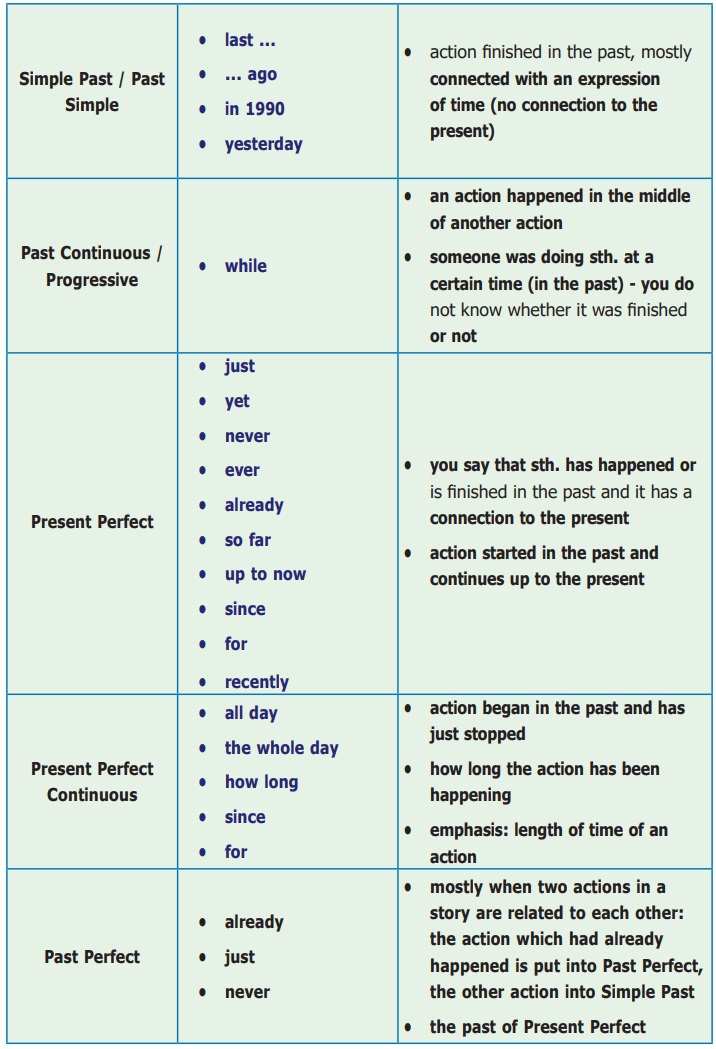
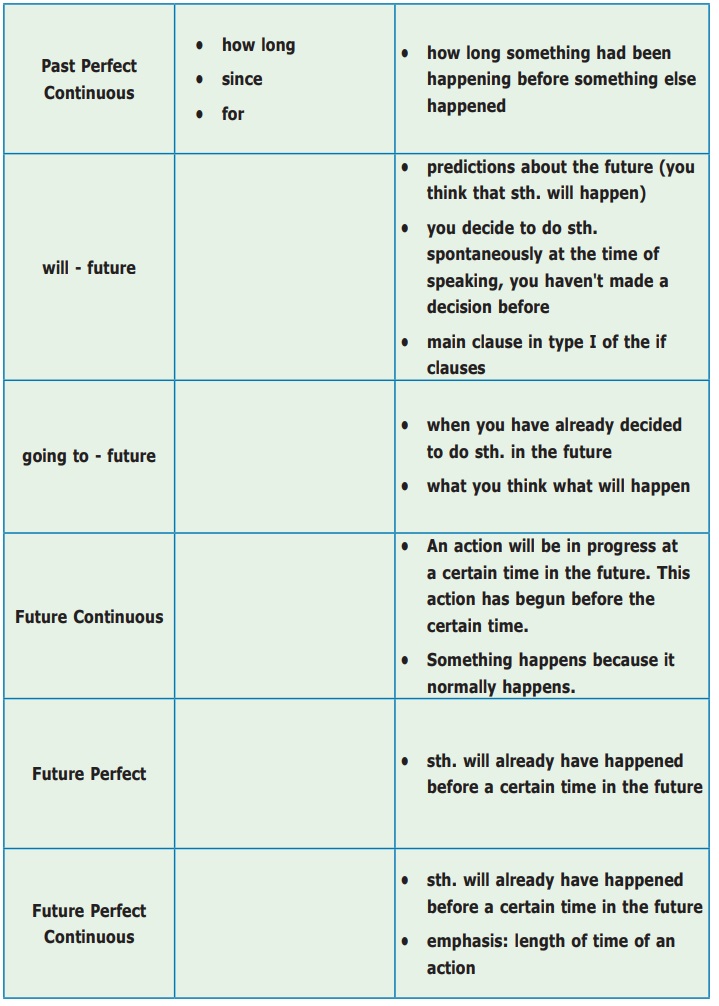
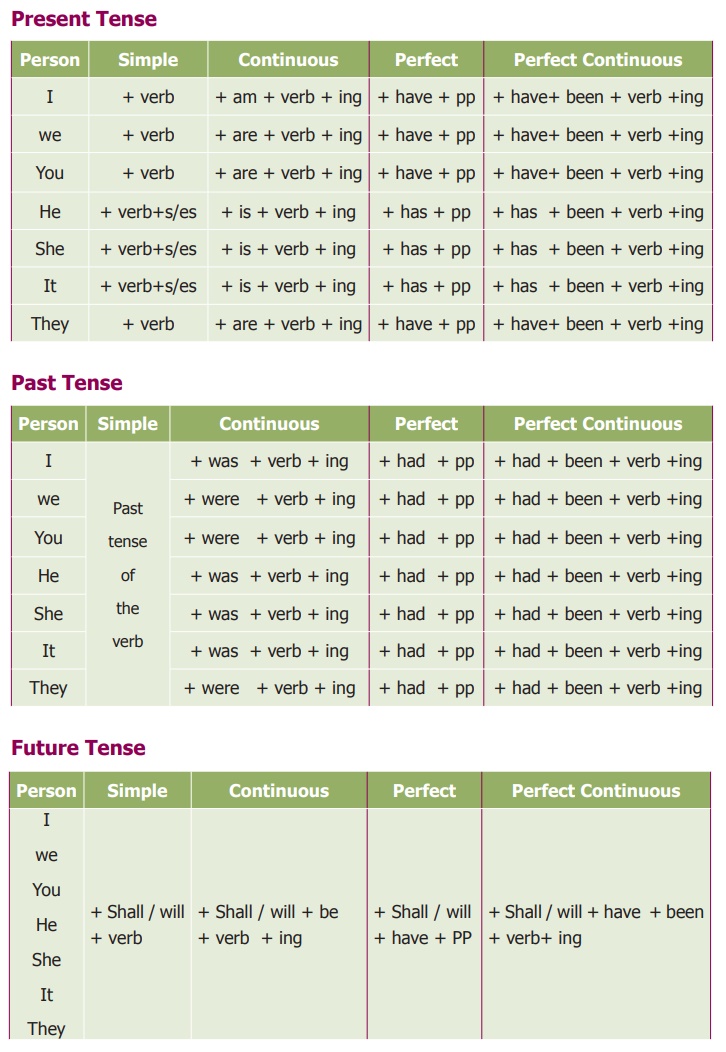
B. Fill in the blanks with appropriate form of the verbs given in the brackets.
1. When the burglars broke into the house, everybody was having a (have) sound sleep.
2. The milk was spitting (spill) over as she went to see the crowd passing by with loud slogans.
3. If Karthik did not make (not + make) any mistake, he will be rewarded.
4. They were watching TV when they heard (hear) a loud bang at the door.
5. The bus left (leave) the stop before we could catch it.
6. Arya had been playing (play) the same song for last three days. It has become boring now.
7. Manju called (call) after we reach home.
8. The show will have been completed (complete) its one thousand episodes by next month.
9. Don’t worry, we will be reaching (reach) the airport in time.
10. Prasanna has fallen (fall) sick after eating some snacks at the street side shop.
C. Tick the correct option to complete the sentences.
1. The climate of the city _______ mild and pleasant most of the time.
a) is remaining
b) remains
c) was remaining
d) is remained
[Answer: (b) remains]
2. One day he _______ into a hotel in Ooty, a beautiful city in Tamilnadu.
a) booking
b) was booking
c) booked
d) had booked
[Answer: (c) booked]
3. You will certainly _______ rewards for what you are doing.
a) get
b) had got
c) was getting
d) be getting
[Answer: (d) be getting]
4. Do you _______ the day we moved the piano upstairs?
a) Remember
b) remembered
c) are remembering
d) had remembered
[Answer: (a) remember]
4. The rain completely _______ our day.
a) spoilt
b) is spoiling
c) is spoilt
d) was spoilt
[Answer: (a) spoilt]
6. Akbar _______ the king at the age of fifteen after the sudden death of his father.
a) was becoming
b) had become
c) became
d) become
[Answer: (c) became]
7. The criminal _______ the place before the police could reach.
a) was escaping
b) had escaped
c) is escaping
d) will escape
[Answer: (b) had escaped]
8. They _______ all the arrangements before the guest’s arrival.
a) will have made
b) will be made
c) had been making
d) were making
[Answer: (a) will have made]
9. Sabithra _______ her job by tomorrow evening.
a) will be completing
b) will complete
c) will have completed
d) will have been completing
[Answer: (d) will have been completing]
10. Harshini _______ her mother in making rangoli in the yard for last one hour.
a) is helping
b) has helped
c) has been helping
d) helps
[Answer: (c) has been helping]
D. Identify the errors in the sentences given below and rewrite them.
1. I have met him yesterday.
Answer: I met him yesterday.
2. I am watching TV since morning.
Answer: I have been watching TV since this morning.
3. She is seeming sad.
Answer: She seems sad.
4. She watched TV when her husband came.
Answer: She was watching TV when her husband came.
5. He is having a cellular phone.
Answer: He has a cellular phone.
6. I heard him to speak on several subjects.
Answer: I heard him speak on several subjects, (to – deleted)
7. Ten candidates have passed one failed.
Answer: Ten candidates have passed and one failed.
8. He succeeded because he works hard.
Answer: He succeeded because he worked hard.
9. How long are you working in this office?
Answer: How long have you been working in this office?
10. I shall wait for you till you will finish your work.
Answer: I shall wait for you till you finish your work, (will – deleted)
11. When I reached the station, the train already left.
Answer: When I reached the station, the train had already left.
12. She or he have done well.
Answer: She or he has done well.
13. One of the boys are missing.
Answer: One of the boys is missing.
14. None is genuine.
Answer: No one is genuine.
15. She is waiting for you for 3 hours.
Answer: She has been waiting for you for 3 hours.
GRAMMAR ADDITIONAL
TENSE – TIME
Fill in the blanks with correct form of the verbs in the brackets.
1. He played football and then————- home, (go)
[Answer: went]
2. He—————– five matches by then, (won)
[Answer: will have won]
3. They were She’ll be—————for you. (look)
[Answer: looking]
4. She’II be—————-tonight (come)
[Answer: coming]
5. By this time she leaves, Jane———– here for 3 years, (live)
[Answer: will have been living]
6. He is a book, (read)
[Answer: reading]
7. He , before I came back from the market, (sleep)
[Answer: had slept]
8. He to London yesterday, (fly)
[Answer: flew]
9.The light went out, while they———–(read)
[Answer: were reading]
10. He when I called, (exercise)
[Answer: had been exercising]
Conditional sentences with ‘If’
Conditional Sentences are also known as Conditional Clauses or If Clauses. They are used to express that the action in the main clause (without if) can only take place if a certain condition (in the clause with if) is fulfilled. There are three types of Conditional Sentences.
Conditional Sentence Type 1
It is possible and also very likely that the condition will be fulfilled.
Example: If I find her address, I’ll send her an invitation.
Conditional Sentence Type 2
It is possible but very unlikely, that the condition will be fulfilled.
Example: If I found her address, I would send her an invitation.
Conditional Sentence Type 3
It is impossible that the condition will be fulfilled because it refers to the past.
Example: If I had found her address, I would have sent her an invitation.
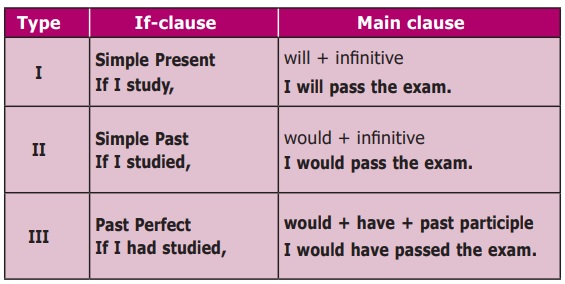
1. Complete the Conditional Sentences. Decide whether to use Type I, II or III.
1. If I had time, I would go (go) shopping with you.
2. If you speak (speak) English, you will get along with them perfectly.
3. If they had gone for a walk, they would have turned (turn) the lights off.
4. If she comes (come) to see us, we will go to the zoo.
5. I would have told you, if I had seen (see) him.
2. Choose the best answer.
1. I will come if I ___________ time.
a. Have
b. had
c. will have
[Answer: (a) have]
2. If he is late, we ___________ without him.
a. would start
b. would have started
c. will start
[Answer: (c) will start]
3. If you ___________ me, I would tell you.
a. will ask
b. asked
c. had asked
[Answer: (b) asked ]
4. Will it be all right if I ___________ a friend tonight?
a. had brought
b. bring
c. brought
[Answer: (a) bring]
5. If you ___________ to learn a musical instrument, you have to practice.
a. wants
b. wanted
c. want
[Answer: (c) want]
3. Match the following.
1. If they worked hard – she will come to our party.
2. If I invite Shalini – I would have bought these shoes.
3. If I had got enough money – they would win.
[Answer: l-(c); 2-(a); 3-(b)]
1. If they worked hard (c) they would win.
2. If I invite Shalini (a) she will come to our party.
3. If I had got enough money (b) I would have bought these shoes.
4. Fill in the blanks with correct verb forms.
1. If you________out with your friends tonight, I________the football match on TV.
a. go, would watch
b. go, will watch
c. go, have watched
[Answer: (b) go, will watch]
2. If he________harder, he________his goals.
a. tries, would reach
b. tried, will reach
c. tried, would reach
[Answer: (c) tried, would reach]
3. If we ____________ to the radio, we_____ the news.
a. listen, would hear
b. had listen, will hear
c. listen, will hear
[Answer: (c) listen, will hear]
ADDITIONAL EXERCISES
CONDITIONAL CLAUSES
I. Choose the best answer:
1. If I play well, I———— the match.
(a) would win
(b) will win
(c) would have won
[Answer: (b) will win]
2. If you wrote neatly, you———— get a prize.
(a) would
(b) will
(c) would have
[Answer: (a) would]
3. If my friend gets the afternoon off, he——– meet me at the station.
(a) would
(b) would have
(c) will
[Answer: (c) will]
4. Would you mind, if I—————- the window?
(a) open
(b) opened
(c) would open
[Answer: (b) opened]
5. If my father don’t pick me up, I————- take the bus home.
(a) will
(b) would
(c) would have
[Answer: (a) will ]
6. If they had invited me, I———– have said no.
(a) will
(b) will not
(c) wouldn’t
[Answer: (c) wouldn’t]
7. If I did it, nobody do it
(a) would
(b) will
(c) will not
[Answer: (a) would]
8. I————buy these, if they fitted me.
(a) will
(b) would have
(c) would
[Answer: (c) would]
9. If he did not know the answer, it——— surprise me.
(a) would not
(b) will
(c) would have
[Answer: (a) would not]
10. If you had switched on the lights, you———–fallen over the chair.
(a) would have
(b) would not have
(c) would
[Answer: (b) would not have]
II. Match the following:
1. If you like me-(a) I would not have attended the party.
2. If you want to make friends- (b) open the door.
3. If opportunity knocks- (c) I will get detention.
4. If it had rained-(d) you can’t be shy
5. If I am late to school- (e) let me go
[Answer: 1. (e); 2. (d); 3. (b); 4. (a); 5. (c)]
III. Fill in the blanks with the correct verb forms :
1. If you,——— I———- with you to the store.
(a) wanted, may come
(b) want, will come
(c) want, would not come
[Answer: (b) want, will come]
2. If I——- date to school, I———– punished.
(a) am, will be
(b) was, would be
(c) was, will be
[Answer: (a) am, will be]
3. If I ——-you, I——— challenge him.
(a) am, will
(b) were, would
(c) was, shall
[Answer: (b) were, would ]
4. If you——— happy, I———- happy.
(a) are, am
(b) were, was
(c) are, was
[Answer: (a) are, am]
5. If there————snow, we———– snowman.
(a) was, made
(b) was, will make
(c) is, make
[Answer: (c) is, will make]
Language Check Point
Incorrect: Work hard lest you will fail.
Correct: Work hard lest you should fail.
Usage: ‘Lest’ must be followed by ‘should.’
Incorrect: I know to cook.
Correct: I know how to cook.
Usage: Before using infinitive, use how/ what/when after the word ‘ know.’
Incorrect: You will never see a man like he
Correct: You will never see a man like him.
Usage: A pronoun takes objective case after like or unlike.













